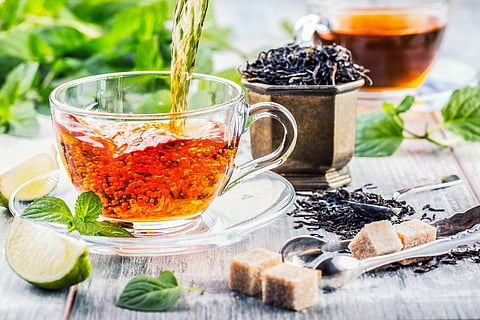
- Destinations
- Experiences
- Stay
- What's new
- Editor’s Picks
- Responsible Tourism
- CampaignsCampaigns
- Subscribe

Darjeeling Tea
Called the Champagne of Teas, Darjeeling tea was the first product to get the Geographical Indication (GI) tag in India, in October 2004. Known for its unique aroma and taste, the tea takes its name from Darjeeling, the eponymous town and region, where the first bushes were planted in the early 1800s as an experiment with the Chinese variety. According to the Tea Board of India only the tea grown at an elevation ranging from 600 to 2000 metres above sea level, in 87 identified gardens (in Darjeeling and Kalimpong districts of West Bengal), qualify as 'Darjeeling Tea'. Sample the perfect cup at the iconic Flurys tea room on Park Street.
Shop at Biswa Bangla stores, tea shops in Lake Market and Gariahat, Dolly's Tea Shop in Dakshinapan.
Joynagar Moa
This fragile sweet from Bengal is available only for a short period in the winter. The famous 'moa' of Joynagar is a winter must-buy for all Bengali households. Handcrafted from the village situated close to Kolkata, this concoction sends everyone into a food coma. A moa is made with khoi (puffed rice), is fragile and soft, and melts in your mouth. Laced with cardamom and Bengal's legendary nolen gur (a liquid jaggery made from date palms and found only in winter), it is a ball-shaped piece of heaven. The best ones are made with khoi from a rice variety known as kanakchur. And the jaggery - it's best if it is poyra gur (the batch made from the first sap of the season).
Shop at Most sweet shops in Kolkata stock them for a short period in winter.
Banglar Rosogolla
One can safely label these fluffy white rounds as the most popular sweets from Bengal. There are many versions availabe, but inorder to get the actual GI logo, the sweet makers have to measure up to several rules - they have to use pure chhana (cottage cheese) without any starch, and they have to do careful kneading for the right texture and chewiness, they have to weigh 10 gm, and they have to be soaked in a transparent, light syrup with a 30 to 40 per cent sugar concentration.
Shop at In Kolkata, some sweet shops have met the requirements and can sell the 'Banglar rosogolla'. These include the inventor of rosogolla - Nobin Chandra Das&rsquo family&rsquos K.C Das. Others include Sen Mahasay, Balaram Mullick and Radharaman Mullick, and Chittaranjan Mistanna Bhandar.
Burdwan&rsquos Sitabhog and Mihidana
Often pronounced as a pair, these two special sweets from Bardhaman (also Burdwan, and now divided into two districts) in West Bengal are little known beyond the state. Mihidana (&lsquomihi&rsquo meaning &lsquofine&rsquo and &lsquodana&rsquo meaning &lsquograin&rsquo or &lsquogranular&rsquo) is easily identified by its yellow colour. The paste made by mixing powdered rice (Gobindobhog or Kaminibhog) flour and Bengal gram flour with a hint of saffron is passed through a sieve into hot ghee the granular mass is then dipped in sugar syrup and drained. Sitabhog which is white in colour and looks like tiny strands of vermicelli, is made of Gobindobhog rice flour, chhana (cottage cheese) and sugar and ghee, while tiny Gulab Jamun like globules are added to the finished product along with garnishings. It is said that both the sweets were prepared by the local sweet makers under instruction from the Maharaja of Burdwan who wanted to offer something special to his British guests. Both got their separate GI tags in 2017.
Shop at Ganesh Sweets in Burdwan. Some Bangla mishti shops in Kolkata also stock these.
Gobindobhog Rice and Tulaipanji Rice
The only other non-sweet product with a GI tag in this list (apart from Darjeeling tea) are these two varieties of heirloom Bengal rice. The soil and climate of Bengal has given rise to several varieties of fragrant rice. Reports say that there are around 35 &ndash 40 fragrant rice varieties here. And gobindobhog is the most famous and popular of them. For generations, this sticky rice has been used to make pulao, payesh and for the main bhog during Durga Pujo, the winter pithas and even the GI tag sweets - Burdwan mihidana and sitabhog.
One of the oldest native rice varieties found in Bengal is tulaipanji. Grown for centuries via traditional methods, there are even folk songs dedicated to this fragrant and delicate rice. The name come from the word 'tulan' or 'tulashali' which means aromatic, and soft - like cotton.
Shop at Biswa Bangla stores. Amar Khamar in Dhakuria. grocery stores in old local markets like Gariahat and Lake Market.
